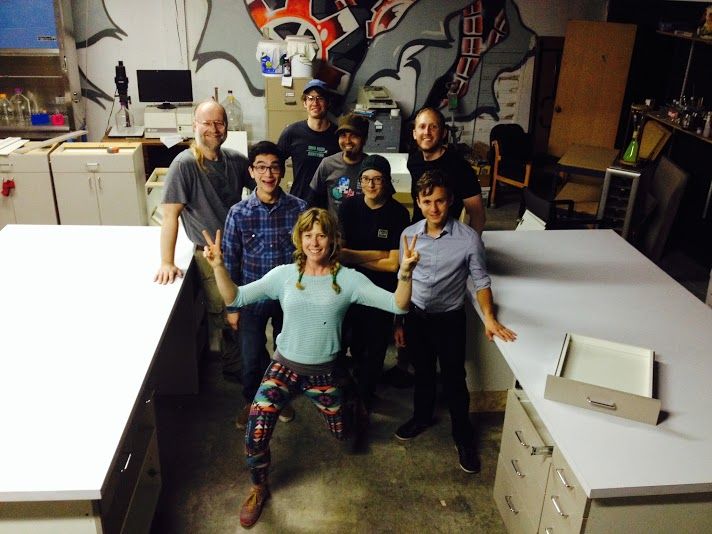
Title image: Counter Culture Labs consists of DIY biologists and citizen scientists. Courtesy of Counter Culture Labs.
Biotechnology has blossomed in the Bay Area but it doesn’t have to stay restricted to just industry or universities. The do-it-yourself biology movement is bringing biotech to the heart of the Oakland community. Counter Culture Labs (CCL) is a non-profit public lab space that recently popped up in the Temescal neighborhood. Cleverly named, it represents a budding counter culture, which supports open-source biotechnology for anyone. Many of its members creatively refer to themselves as biohackers. For co-founder Dr. Patrik D’haeseleer, it helps rejuvenate his daytime career as a research scientist in microbial systems biology at Lawrence Livermore National Laboratory. He believes that biology is the next technology of the 21st century. “We want to demystify and democratize these technologies because they are going to affect all peoples’ lives. It’s all about tinkering with ideas and exploring cool science projects,” says Patrik.
[caption id="attachment\\_12797" align="aligncenter" width="1024"][](http://berkeleysciencereview.com/wp-content/uploads/2015/05/At-the-bench.jpg) Another ongoing project at CCL is the sequencing and identification of local mushroom species. DNA extracted from mushrooms have been prepped for gel electrophoresis.[/caption]
This space is truly for anyone. Check their Meetup group website and you will discover the diversity of events and projects CCL runs. It holds workshops ranging from basic molecular biology to creating beautiful biological art. Jacob Statkenov, another CCL founding member describes it as a place for people to share skills and refine techniques in a low risk environment. Young scientists in between jobs can make themselves more marketable here. “It gets industry and academics in the same room talking,” says Jacob. “A lot of good conversations happen here.” CCL also collaborates on projects with BioCurious, another biohacker space based in Sunnyvale California. In particular, the two groups are working on the Real Vegan Cheese Project, which won the best “Community Labs Project” award at the annual international Genetically Engineered Machine iGEM competition last year. They are engineering yeast to produce milk proteins for making cheese that is genuinely vegan, no cows involved. In fact, they can make the cheese with half the amount of green house gasses as conventional cheese. CCL plans to compete again in this year’s iGEM competition, but just to enter it costs thousands of dollars. CCL has been on a shoestring budget and it can be a struggle to fund projects and pay rent each month.
[caption id="attachment\\_12798" align="aligncenter" width="1024"][](http://berkeleysciencereview.com/wp-content/uploads/2015/05/A-Biohackers-dream-space.jpg) CCL holds its lab space in Omni commons, a community building that is home to several grassroots collectives. Credit: Angela Kaczmarczyk.[/caption]
Recently, CCL launched a $30,000 crowdfunding campaign through Kickstarter. This Kickstarter will serve as a membership drive and fund infrastructure upgrades. With still 22 days to go, CCL’s Kickstarter has raised a little over half its goal. The pledge awards include a nerdy necklace that features a 3D-printed model of Chymosin, the enzyme responsible for curdling. Top donators can even be immortalized by having a newly discovered bacterial strain published and named in their honor. Mary West, an entrepreneur and co-founder of CCL is passionate about the DIY bio movement on the global scale. A few other DIY bio labs exist in other parts of the world, including Genspace in New York, and La Paillasse in Paris. “We’re bringing the science back to the people,” says Mary. “If we’re successful here, its a model that can open up at other places.”
Additional resources:



